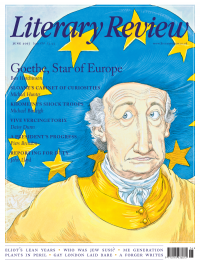James Purdon
Ringing Off
Phone
By Will Self
Viking 618pp £18.99
Phone, the final part in a trilogy, follows two predecessors each composed under the sign of a different icon of modernity. Umbrella – mass-manufactured object, phallic fetish, civil servant’s companion – was about the mutually reinforcing relationship between the 20th century’s new forms of mechanical production and its new forms of mechanised and rationalised violence. It saw Will Self’s recurring maverick 1970s psychiatrist, Dr Zack Busner, pioneering a cure for encephalitis lethargica, a machine-age epidemic that, after the First World War, left its sufferers frozen in time: motionlessly comatose or caught in compulsive loops of repetitive movement.
Psychopathologies of this sort are the manifestation of what Umbrella, in a lucid moment, describes as ‘the stop/start, the on/off, the 0/1, of a two-step with technology’. That ongoing danse macabre between psychosis and technological modernity can be thought of as the trilogy’s guiding principle. Umbrella’s sequel, Shark (2014), both

Sign Up to our newsletter
Receive free articles, highlights from the archive, news, details of prizes, and much more.@Lit_Review
Follow Literary Review on Twitter
Twitter Feed
Though Jean-Michel Basquiat was a sensation in his lifetime, it was thirty years after his death that one of his pieces fetched a record price of $110.5 million.
Stephen Smith explores the artist's starry afterlife.
Stephen Smith - Paint Fast, Die Young
Stephen Smith: Paint Fast, Die Young - Jean-Michel Basquiat: The Making of an Icon by Doug Woodham
literaryreview.co.uk
15th-century news transmission was a slow business, reliant on horses and ships. As the centuries passed, though, mass newspapers and faster transport sped things up.
John Adamson examines how this evolution changed Europe.
John Adamson - Hold the Front Page
John Adamson: Hold the Front Page - The Great Exchange: Making the News in Early Modern Europe by Joad Raymond Wren
literaryreview.co.uk
"Every page of "Killing the Dead" bursts with fresh insights and deliciously gory details. And, like all the best vampires, it’ll come back to haunt you long after you think you’re done."
✍️My review of John Blair's new book for @Lit_Review
Alexander Lee - Dead Men Walking
Alexander Lee: Dead Men Walking - Killing the Dead: Vampire Epidemics from Mesopotamia to the New World by John Blair
literaryreview.co.uk